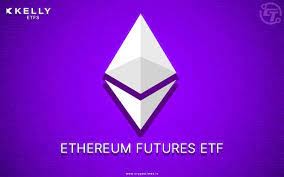The world of cryptocurrencies continues to captivate investors with its potential for growth and innovation. As cryptocurrencies gain mainstream recognition, investment options are expanding to meet the demands of market participants. One such development is the introduction of Ethereum Futures Exchange-Traded Funds (ETFs). In this article, we will explore the emergence of Ethereum Futures ETFs and their potential to revolutionize investment strategies in the digital asset space.
Understanding Ethereum Futures ETFs
Ethereum Futures ETFs are investment vehicles that offer exposure to Ethereum futures contracts, rather than directly holding the underlying cryptocurrency. These ETFs aim to track the price movements and performance of Ethereum futures, allowing investors to participate in the potential gains or losses of Ethereum without having to navigate the complexities of trading futures contracts themselves.
Here’s a breakdown of how Ethereum Futures ETFs work:
Structure:
Similar to other exchange-traded funds (ETFs), Ethereum Futures ETFs are traded on traditional stock exchanges. Investors can buy and sell shares of the ETF through their brokerage accounts, making it a convenient and familiar investment vehicle.
Ethereum Futures Contracts:
Ethereum futures contracts allow investors to speculate on the future price of Ethereum. These contracts are derivative instruments with a predetermined expiration date and are settled in cash. The ETF invests in a diversified portfolio of Ethereum futures contracts, providing investors with exposure to the potential gains or losses of Ethereum’s price.
Objectives:
The primary objective of Ethereum Futures ETFs is to track the performance of Ethereum futures contracts. The ETF aims to replicate the price movements of the underlying Ethereum futures, allowing investors to gain exposure to Ethereum’s price without directly holding the cryptocurrency.
Diversification:
To mitigate risk, Ethereum Futures ETFs typically hold a diversified portfolio of Ethereum futures contracts. This diversification helps spread risk across multiple contracts and reduces the impact of any single contract on the overall performance of the ETF.
Market Impact:
The introduction of Ethereum Futures ETFs can have several potential impacts on the market. It can attract institutional investors who prefer regulated investment vehicles, potentially leading to increased liquidity and price stability in the Ethereum futures market. Additionally, the ETF’s participation in the futures market can enhance price discovery and market efficiency.
Considerations:
Investors should carefully consider the risks associated with investing in Ethereum Futures ETFs. Ethereum, like other cryptocurrencies, is known for its price volatility. This volatility can be reflected in the performance of Ethereum futures contracts. Additionally, investors should be aware of the regulatory landscape and specific requirements applicable to Ethereum Futures ETFs in their respective jurisdictions.
Advantages of Ethereum Futures ETFs:
a) Portfolio Diversification: Ethereum Futures ETFs provide investors with a new avenue to diversify their portfolios. By adding exposure to Ethereum futures, investors can potentially benefit from the growth of the Ethereum network while spreading their risk across different asset classes.
b) Regulatory Oversight: ETFs are regulated investment products that offer a layer of oversight and investor protection. Ethereum Futures ETFs provide a regulated framework for investors to access the Ethereum market, offering transparency and compliance with existing financial regulations.
c) Accessibility and Convenience: Ethereum Futures ETFs are traded on traditional stock exchanges, making them easily accessible to a broader range of investors. This accessibility eliminates the need for investors to navigate the complexities of cryptocurrency exchanges or futures trading platforms.
Potential Impact on the Market:
a) Market Efficiency: The introduction of Ethereum Futures ETFs may contribute to increased market efficiency by providing a regulated and transparent mechanism for price discovery. The availability of ETFs can attract more liquidity to the Ethereum futures market, potentially leading to tighter bid-ask spreads and enhanced market stability.
b) Institutional Adoption: The introduction of regulated investment products like Ethereum Futures ETFs can pave the way for increased institutional adoption of cryptocurrencies. Institutional investors often prefer investment vehicles with clear regulatory frameworks, which can help bridge the gap between traditional finance and the crypto ecosystem.
c) Price Discovery and Volatility: The launch of Ethereum Futures ETFs could potentially impact the price discovery process and volatility of Ethereum. Increased participation from ETF investors may introduce additional factors that influence the price dynamics of Ethereum futures contracts.
Considerations and Risks
a) Volatility: Cryptocurrencies, including Ethereum, are known for their price volatility. Investors should be aware that investing in Ethereum Futures ETFs does not eliminate this volatility. It is crucial to assess one’s risk tolerance and understand the potential risks associated with investing in the Ethereum market.
b) Regulatory Landscape: The regulatory environment surrounding Ethereum Futures ETFs may vary across jurisdictions. Investors should stay informed about the regulatory requirements and restrictions in their respective regions before considering investments in these ETFs.
Conclusion
The introduction of Ethereum Futures ETFs represents an exciting development in the digital asset investment landscape. These ETFs provide investors with regulated access to Ethereum futures contracts, enabling portfolio diversification and potentially attracting broader participation from institutional investors. However, it is essential to conduct thorough research, assess risk tolerance, and stay informed about regulatory changes to make informed investment decisions in this evolving market.
Disclaimer: The information provided in this article is for educational purposes only and should not be considered as financial or investment advice. Investors should conduct their own research and consult with a qualified financial advisor before making any investment decisions.




